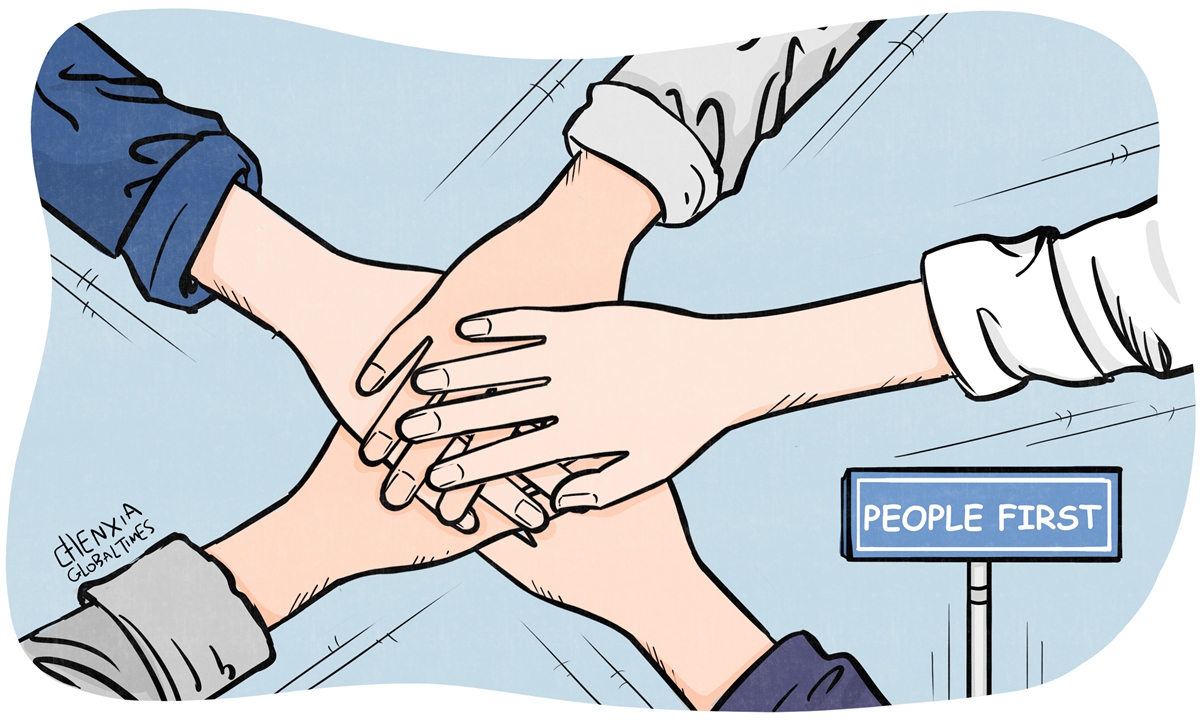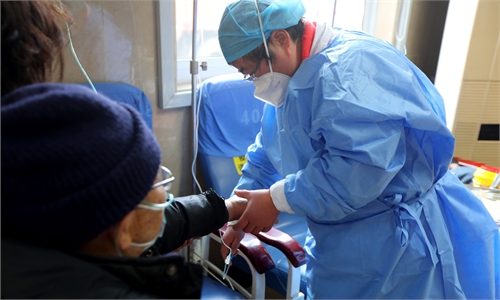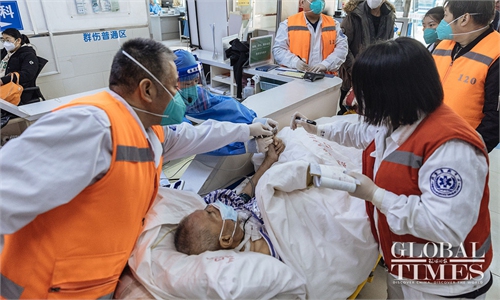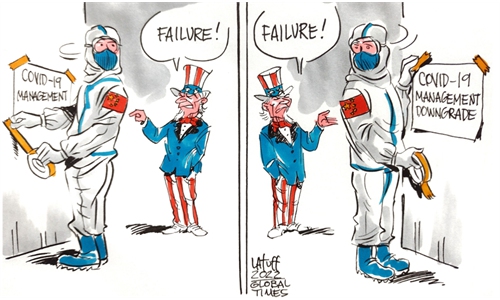
Illustration: Chen Xia/Global Times
As an international public health emergency, the COVID-19 pandemic has caused global health challenges, and the concept of mankind's joint response to disasters has also seen confrontations and agitations. China, as a country with a huge population, has achieved effective control of the epidemic over the past three years. There are some different angles to observe the adjustment and optimization of the epidemic prevention policy in the later period, amid the political context and ideological differences in the current global epidemic-related governance.During the epidemic period, the amount of various information is abundant, the analysis dimensions are broad, and the cognitive direction is complex. Accompanied by various marketing languages and misinformation, it is easy for some people to be in a state of anxiety.
Undoubtedly, discussions on public governance should be open and frank, but we should also be aware that all public discussions on human organizational behavior should be done responsibly. When someone starts to abandon reason, gets tired of peace and resorts to anger, abuse and venting, this polarized thinking will cause more problems.
Strenuous exploration
The most serious thing is that in the long run, extreme emotions serve to disrupt normal thinking in society, distort the real situation, and cause a decline in critical thinking.
This also touches on a deeper issue, that is, we should put epidemic-related governance through lens of the past and future of the country, examine our strenuous exploration of the road to fight the epidemic, and keep it alive.
Returning to the beginning of the outbreak, the first question we must face was "what kind of incident is this?" This question also led to a more complicated question, that is, is there a person or a governance body that can understand the epidemic from all dimensions at the beginning? An objective situation is that even at present, no governance body has absolutely mastered all the situations involved in the epidemic, and no scientist has thoroughly and comprehensively studied the novel coronavirus.
Therefore, when we use the most frank and simple eyes to look back at the problems that we inevitably faced at the beginning, we can understand the difficulties in governance China faced three years ago. China was the first country to face this highly uncertain, extremely risky and destructive epidemic. In order to avoid disruption of social order and serious threats to public health, our top priority must be rationally, scientifically, and effectively protecting people's lives. This is the starting point of all our epidemic prevention decisions.
When the understanding of the novel coronavirus and the epidemic situation were not completely clear, any government must "cross the river by touching the stones." For China, the first course of action is to proceed from the basic national conditions and insist on "people first, life first." If the epidemic-related governance is divided into four stages, we can clearly understand many problems.
The first period is the COVID-19 epidemic emerging in Wuhan before May 2020. Under the strong leadership of the Central Committee of the Communist Party of China (CPC) with Comrade Xi Jinping at its core, China in that stage achieved effective control of the epidemic with significant institutional advantages through major initiatives such as emphasizing local officials' responsibility to protect the territory they govern from the virus and rendering assistance from other provinces to Hubei.
The second period went through the second half of 2020. Under the decisions and deployment of the CPC Central Committee, the nationwide spread of the epidemic was basically effectively curbed in the short term by mobilizing initiatives of local governments. As a result, it has shaped a generally healthy environment for the exchanges at home and economic development.
The third period started in 2021 and lasted until the first half of 2022. Through the implementation of the dynamic zero-COVID policy, we have been able to control a possible full-blown epidemic outbreak. It avoided a situation that could put the health of more than one billion people at risk and maintained the overall stability of social order.
Now, the second half of 2022 is considered to be the fourth phase. In response to the constant virus mutation, China has adjusted and optimized its epidemic prevention and control measures according to the newly emerged situation where the virus becomes weaker, but we grow stronger.
Therefore, the decisions in these four periods are first and foremost centered on protecting human life and health, which requires a meticulous sense of responsibility and extraordinary endurance.
It can be said that with the unshakeable spiritual mission of putting people and lives first, China's epidemic prevention and control has left three lasting historical marks.
Optimized adjustment
First, "putting people and lives first" is the original aspiration and starting point of China's governance on epidemic-related issues. In particular, Chinese people have a unique understanding of life; that is, they must not let the epidemic rage and let people "die free." And political ethics must take up its mission in this regard.
Second, this was a period of exceptional governance. This means a force with authority to enforce specific laws is needed to appropriately coordinate resources in the society based on universal norms in times of emergency or temporary public norms. Therefore, China has primarily supported the right to social assistance based on the concept of collective security.
Third, in the context of COVID-19 and its governance, the most pressing issue is not absolute high-speed growth, but the first priority of protecting people's lives and health through epidemic governance. Facts have proven that through effective control of the epidemic, China has been one of the most outstanding major economies in the world during this period.
We can make timely adjustments based on our growing understanding of the virus by examining the adjustment and optimization of epidemic prevention measures, allowing people to become directly responsible for their own health.
As the pathogenicity of the mutated strain of coronavirus has significantly weakened compared to the initial one, the cumulative coverage of the number of people who have been fully vaccinated with the COVID-19 vaccine reported nationwide, the continuous strengthening of the hierarchical diagnosis and treatment system, the continuous improvement of people's health awareness, and the ability to deal with emergencies gradually prepare for epidemic prevention and control measures, especially after popular acceptance, and under the premise of the rule of law, the government has adjusted and optimized the epidemic prevention measures.
At present, in response to the epidemic situation in some areas, on one hand, the relevant departments are stepping up the supply of normalized public medical products. On the other, we are also continuing to improve medical treatment capabilities over a specific period. Hence, based on the scientific understanding of the COVID-19 epidemic, China will continue to improve its epidemic governance in the second half of the process through effective measures.
It is very necessary to understand China's epidemic governance historically.
In the past three years, no one has been able to say that they don't care about the question of "how much it would have cost in lives" if prevention and control were not implemented from the beginning. Discussions about the pandemic are almost all conducted in a "hypothetic context," but the problem facing policymakers is real, because each life lost is not a cold statistic or an economic cost, but a living father and mother, husband and wife, child and elderly person.
The Chinese people's concept of life is the product of a unique and long history and civilizational consciousness. It not only means that our country must scientifically grasp the changes in the epidemic situation in all stages of COVID-19 epidemic governance, but it also means that the country must shoulder its own mission, that is, "people first, life first."
The author is a professor at the Human Rights Institute of Southwest University of Political Science and Law. opinion@globaltimes.com.cn



